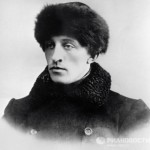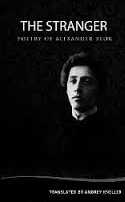In the late 19th century, “Symbolism” became a major influence upon the arts. It started with Charles Baudelaire, who was strongly influenced by the writings of Edgar Allen Poe. Symbolists believed that art was all about absolute truth, which could only be expressed indirectly. And so they focused on metaphors and other symbols.
Symbolism affected fiction, poetry, painting, and music; some of the artists and writers embracing it or influenced by it were Richard Wagner, Fyodor Dostoevsky, Edvard Munch, Henrik Ibsen, Frederic Nietzsche, Paul Verlaine, and Oscar Wilde, among many others.

Blok was born in St. Petersburg. His father was a law professor; his mother, a writer. The marriage didn’t last; Blok was raised by relatives near Moscow. His first collection of poetry, entitled Verses About the Lady Beautiful, was published in 1904 (and were poems written about his wife, the daughter of the chemist Dmitri Mendeleev). Other collections followed, and Blok came to be considered the finest Russian poet of the so-called Silver Age. Russian poets who paid tribute to Blok as major influences on their own poetry include Boris Pasternak, Marina Tsvetaeva, Anna Akhmatova, and Vladimir Nabokov.
Translator and poet Andrey Kneller has assembled 34 of Blok’s poems into a collection entitled The Stranger: Selected Poetry of Alexander Blok, a solid introduction to Blok’s poetry. It includes the title poem “The Stranger, ” and it includes this one, dated 1906, and which takes the title from its first line:
Night. The city grew calm…
Night. The city grew calm.
Behind the large window
The mood is solemn and somber,
As if a man is dying.
But there someone stands simply sad,
Troubled by his misfortune,
With an opened collar,
And looks at the stars.
“Stars, stars,
Tell me the cause of grief!”
And he looks at the stars.
“Stars, stars,
Where did such anguish come from?”
And the stars tell him,
The stars tell him everything.

His influence lived on, however. Even today, he’s still considered one of Russia’s best poets. With The Stranger, Kneller has thoughtfully assembled a representative sample of Blok’s poems. You read them, and you forget about Symbolism and movements in the arts, and even wear and revolution. Instead, you read love poems that metaphorically speak to human existence across decades and cultures.
Image by Georgie Pauwels, Creative Commons via Flickr. Post by Glynn Young, author of the novels Dancing Priest and A Light Shining, and Poetry at Work.
Want to brighten your morning coffee?
Subscribe to Every Day Poems and find some beauty in your inbox.
- The Collected Poems of J.R.R. Tolkien - January 23, 2025
- Poets and Poems: Luke Harvey and “Let’s Call It Home” - January 21, 2025
- Epigrams and Epitaphs: Martin Armstrong and “Fifty-Four Conceits” - January 16, 2025

Maureen Doallas says
The first line of the poem here is unexpected, as night usually is not associated with calm but with what is unknown, not seen, and scary. The poem itself is remarkably contemporary; it could have been written about the world today.
Glynn says
Maureen – it does seem contemporary. I’m tempted to say that’s true of all good poetry but classic poetry with its language and rhyming often seems contemporary in what it expresses, not in how it’s written. Thanks for e comment!